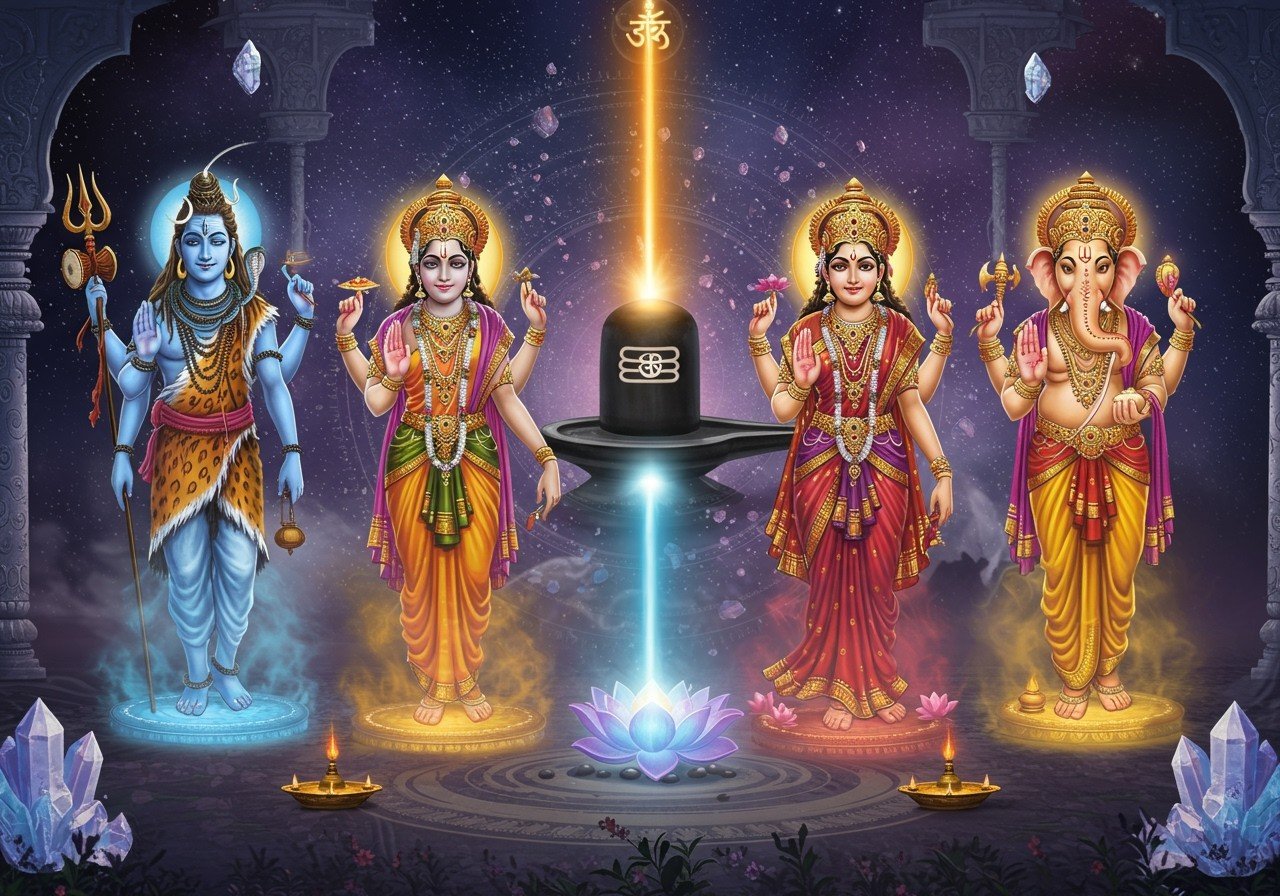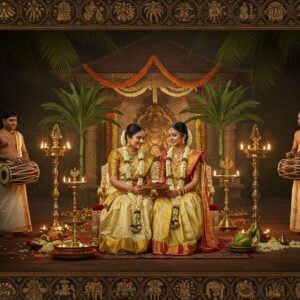
The Smarta Tradition stands as a significant pillar within Hinduism, seamlessly blending profound philosophical concepts with practical rituals. This guide offers a detailed exploration of its core principles, historical context, and enduring relevance in contemporary times. For individuals who value their cultural heritage and seek authentic spiritual practices, this exploration illuminates how the Smarta Tradition continues to enrich both spiritual and daily life. Those seeking to deepen their spiritual practice can find a wide selection of puja items and other religious goods at poojn.in, India’s leading online store for cultural and religious products.
What Defines the Smarta Tradition? Exploring its Origins and Significance
The Smarta Tradition traces its origins back to the teachings of Adi Shankaracharya, a revered philosopher and theologian within Hinduism. This tradition embraces the worship of five principal deities: Shiva, Vishnu, Shakti, Surya, and Ganesha, collectively known as the Panchayatana. This practice acknowledges the diversity of divine manifestations and allows for personal preference in worship, enabling followers to connect with the deity that resonates most deeply with them. The Smarta Tradition’s non-sectarian nature fosters universalism and inclusivity, preserving ancient Vedic customs and rituals. It has made substantial contributions to Hindu philosophy, promoting unity and religious tolerance among diverse sects within the broader Hindu faith. You can explore our collection of deity-specific items at poojn.in.
Understanding the Essence of Smarta: Harmony Amidst Diversity
The term “Smarta” originates from “Smriti,” referring to traditions rooted in human memory and texts beyond the Vedas. This tradition harmonizes worship with a monistic perspective, perceiving all deities as expressions of Brahman, the ultimate reality. The Smarta Tradition achieves a balance between the intellectual pursuit of jnana (knowledge) and the performance of karma (rituals), offering a comprehensive religious experience. Rituals hold a central place in daily life within the Smarta Tradition. Domestic ceremonies, known as samskaras, are guided by Smriti texts, linking followers to their heritage and infusing everyday life with spiritual meaning. Explore a wide range of items for your puja needs at poojn.in. Advaita Vedanta forms the philosophical foundation of the Smarta Tradition, emphasizing the oneness of the individual soul (Atman) with Brahman. This philosophy encourages personal spiritual evolution, providing a framework for individuals to explore and experience divine unity. Shiva lingams and other sacred items are available at poojn.in.
The Smarta Tradition within Hinduism: Bridging Diverse Beliefs
Within the tapestry of Hinduism, the Smarta Tradition plays a vital role in countering rigid orthodoxy by promoting a philosophical approach to spirituality. Adi Shankaracharya, a towering figure in Hindu philosophy, revitalized this tradition. His teachings inspire followers to pursue wisdom and enlightenment. The Smarta Tradition’s influence is evident in Hindu temples and standardized rituals, fostering unity among diverse beliefs. This inclusivity encourages religious tolerance and mutual understanding. In the modern era, the tradition adapts to contemporary challenges while upholding its core values. Its practices extend to the global Indian diaspora, connecting individuals to their roots through spiritual engagement. Tulsi malas and other items for your spiritual practice are available at poojn.in.
Core Principles of the Smarta Tradition: A Path to Spiritual Development
At the core of the Smarta Tradition lies the reverence for five deities: Shiva, Vishnu, Shakti, Surya, and Ganesha. This practice, known as Panchayatana Puja, embodies inclusivity and respect for diverse expressions of the divine. Personal spiritual growth is paramount within this tradition. Followers are encouraged to cultivate a balance between knowledge (jnana), devotion (bhakti), and action (karma). The concept of ‘Ishta Devata’ allows individuals to choose a personal deity for focused worship, deepening their connection with the divine. Dharma, or righteous conduct, guides moral behavior, aligning with the principles of Smriti texts. Inner purity and self-discipline are regarded as pathways to realizing truth and attaining spiritual enlightenment. Find a wide variety of religious items at poojn.in.
The Continuing Relevance of the Smarta Tradition: Connecting Ancient Wisdom with Modern Living
The Smarta Tradition maintains its relevance in contemporary Hindu practice. It provides a framework for integrating ancient spiritual wisdom with modern life, adapting to the evolving needs of India’s dynamic society. Explore how ancient wisdom applies to modern life. Online platforms and digital media play a key role in disseminating Smarta teachings globally, fostering interfaith dialogue and understanding in multicultural environments. Despite modern influences, the tradition retains its authenticity. Individuals can seamlessly incorporate Smarta principles into their daily lives, enriching their spiritual journeys and finding deeper fulfillment. Learn more about Dharma and righteous living. This exploration highlights how the Smarta Tradition continues to shape both spiritual and daily life for those who cherish their cultural roots and value authentic rituals. You can find various puja kits and other ritual items at poojn.in.
How Poojn.in Supports Your Smarta Tradition Observance
Poojn.in offers a wide selection of products essential for Smarta tradition rituals and daily worship practices. Our online platform provides authentic puja items aligned with Smarta principles of worshipping the five primary deities—Shiva, Vishnu, Surya, Ganesha, and Devi. For Smarta practitioners, Poojn.in offers:
- Complete Pancha Devata puja sets. These sets include everything you need for complete and proper worship. They are crafted with care and respect for tradition.
- Pure copper and brass vessels for ritual use, crafted according to traditional guidelines for purity and efficacy in your practices. These vessels are designed for longevity and beauty.
- Traditional bell metal items, handcrafted and infused with spiritual significance. These items enhance the resonance of your rituals.
- Authentic rudraksha malas. Sourced responsibly and strung with care, these malas support your meditation and japa practices.
- Pure cotton upavastras (ritual clothing), providing comfort and adherence to traditional customs during ceremonies. Choose from a variety of styles and sizes.
- Sandalwood and vibhuti for tilak, ensuring purity and authenticity in your markings. These products are sourced from trusted suppliers.
- Specialized puja items for each deity:
- Shiva: Rudraksha beads, abhisheka items. These products are specifically chosen for their significance in Shiva worship.
- Vishnu: Tulsi mala, shaligram stones. Enhance your Vishnu puja with authentic and high-quality items.
- Surya: Copper surya yantra. These intricately designed yantras focus the energy of Surya for your benefit.
- Ganesha: Modak offering items. Make traditional offerings with beautiful and appropriate serving dishes.
- Devi: Kumkum and turmeric holders. Keep your sacred powders fresh and ready for use with these dedicated holders.
Poojn.in guarantees that all items meet traditional specifications and are sourced from verified vendors. Each product listing includes detailed information about proper usage in Smarta rituals. Poojn.in delivers across India, offering practitioners convenient access to authentic ritual items while preserving the sanctity of Smarta traditions. For bulk orders of items for temple or community use, Poojn.in offers special pricing and dedicated support. The platform upholds strict quality standards for all ritual items, especially those used in formal worship ceremonies. Browse our selection at Poojn.in and enhance your Smarta observance with authentic, high-quality products.
Embracing the Smarta Tradition: A Timeless Path
Embracing the Smarta Tradition offers a timeless journey, bridging ancient wisdom with modern life. Its core principles provide a harmonious path, enriching your spiritual life while honoring cultural heritage. By practicing Panchayatana Puja and balancing knowledge, devotion, and action, you forge a deep connection with both the divine and your ancestral roots. Incorporating these teachings into daily life fosters spiritual growth and fulfillment. The adaptability of the Smarta Tradition ensures its continued relevance, fostering unity and understanding across diverse beliefs. Online platforms provide convenient access to explore this rich tradition and participate in its rituals, keeping your spiritual connection vibrant. Discover more about Hinduism’s celebration of diversity and tradition. Cherish the Smarta Tradition as a beacon of inclusivity and wisdom, illuminating your path with its enduring light. Plan a meaningful pilgrimage with our comprehensive guide.
FAQs: Understanding the Smarta Tradition
What is Smarta Tradition? The Smarta Tradition is a Hindu sect adhering to the teachings and rituals prescribed by the Smritis. It places emphasis on the worship of five major deities: Shiva, Vishnu, Shakti, Ganesha, and Surya, recognizing them as diverse manifestations of the one divine reality. It also places importance on philosophical understanding and personal spiritual growth.
What is the meaning of Smarta Tradition? Derived from the Sanskrit word “Smriti,” meaning “that which is remembered,” the Smarta Tradition encompasses practices and beliefs rooted in ancient Hindu texts. These texts offer guidance for daily rituals and spiritual life, connecting followers to their ancestral heritage and promoting a deeper understanding of dharma.
How does Smarta Tradition relate to Hinduism? As a significant branch of Hinduism, the Smarta Tradition integrates various practices and beliefs from different Hindu sects. It promotes the worship of multiple deities as different facets of the one Brahman, fostering a sense of unity and inclusivity within the broader Hindu faith. The tradition values philosophical understanding alongside ritual practice. Read more about Hinduism.
Who are the five deities worshiped in the Smarta Tradition? The five deities revered in the Smarta Tradition are Shiva, Vishnu, Shakti, Ganesha, and Surya, representing different aspects of the divine. Devotees can choose any of these deities as their preferred focus of worship (Ishta Devata) while respecting the significance of all five.
What are the core principles of the Smarta Tradition? Core principles include the belief in the oneness of the ultimate reality (Brahman), the importance of daily worship and rituals (karma), the pursuit of knowledge and wisdom (jnana), and the acceptance of multiple paths towards spiritual enlightenment (moksha). Deepen your understanding of Dharma.
Is there a specific temple architecture associated with the Smarta Tradition? While no specific architectural style is unique to Smarta temples, they often feature shrines dedicated to each of the five main deities, facilitating the practice of Panchayatana Puja, where all five are worshiped together. This allows devotees to offer reverence to all the deities within a single sacred space.
How does one become a follower of the Smarta Tradition? Becoming a follower involves studying the teachings of the Smritis, engaging in daily rituals and worship of the five major deities, and often seeking guidance from a guru to deepen understanding and practice. It emphasizes continuous learning and personal spiritual development.
Are there special festivals celebrated in the Smarta Tradition? Followers observe major Hindu festivals such as Diwali, Navaratri, and Maha Shivaratri, adapting the celebrations to honor the five main deities. This approach integrates the broader Hindu calendar with the specific focus of the Smarta tradition. Explore temple festivals.


